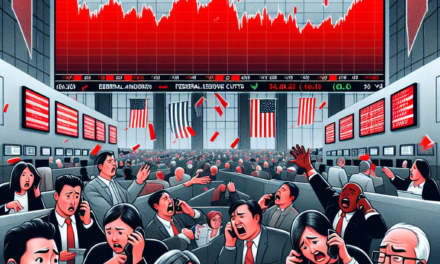“Navigate with Caution: Heed Warren Buffett’s Warnings to Safeguard Your Investments.”
Introduction
Warren Buffett, the legendary investor and CEO of Berkshire Hathaway, has long been a guiding voice in the world of finance, known for his prudent investment strategies and insightful market analyses. Recently, Buffett has issued two significant warnings that have captured the attention of investors worldwide. These warnings, rooted in his decades of experience and deep understanding of market dynamics, highlight potential risks that could impact portfolios and financial strategies. As investors grapple with volatile markets and economic uncertainties, Buffett’s cautions serve as a crucial reminder to reassess investment approaches and consider the broader implications of current financial trends. Understanding the nuances of Buffett’s warnings is essential for investors aiming to navigate the complexities of today’s economic landscape and safeguard their financial futures.
Understanding Warren Buffett’s Investment Philosophy
Warren Buffett, often referred to as the “Oracle of Omaha,” is renowned for his astute investment strategies and profound insights into the financial markets. His investment philosophy, rooted in value investing, emphasizes the importance of understanding the intrinsic value of a company and investing with a long-term perspective. Recently, Buffett issued two major warnings to investors, prompting many to reconsider their strategies and assess the potential implications for their portfolios. To fully grasp the significance of these warnings, it is essential to delve into Buffett’s investment philosophy and understand the principles that guide his decision-making process.
At the core of Buffett’s philosophy is the belief in investing in businesses rather than merely trading stocks. He advocates for a thorough analysis of a company’s fundamentals, including its management, competitive advantages, and financial health. This approach allows investors to identify undervalued companies with strong growth potential, thereby minimizing risk and maximizing returns over time. Buffett’s emphasis on patience and discipline further underscores his commitment to long-term value creation, as he often advises investors to hold onto their investments through market fluctuations and resist the temptation to engage in speculative trading.
In light of this philosophy, Buffett’s recent warnings carry significant weight. The first warning pertains to the current state of the stock market, which he describes as being characterized by excessive speculation and overvaluation. Buffett cautions that many investors are being lured by the allure of quick profits, often disregarding the underlying value of the companies they invest in. This speculative behavior, he warns, could lead to a market correction, resulting in substantial losses for those who fail to exercise due diligence. By highlighting the dangers of speculation, Buffett reinforces the importance of adhering to a disciplined investment strategy that prioritizes long-term value over short-term gains.
The second warning issued by Buffett concerns the broader economic environment, particularly the rising levels of debt and inflation. He notes that the unprecedented fiscal and monetary measures implemented in response to recent global challenges have led to an increase in government and corporate debt. This, coupled with inflationary pressures, poses a significant risk to the stability of financial markets. Buffett advises investors to remain vigilant and consider the potential impact of these macroeconomic factors on their investment portfolios. By doing so, they can better position themselves to navigate potential economic downturns and safeguard their investments against unforeseen challenges.
In conclusion, Warren Buffett’s investment philosophy serves as a guiding light for investors seeking to navigate the complexities of the financial markets. His emphasis on value investing, long-term perspective, and disciplined decision-making provides a solid foundation for building a resilient investment strategy. The recent warnings issued by Buffett underscore the importance of remaining cautious in the face of market speculation and macroeconomic uncertainties. By heeding his advice and adhering to the principles of sound investing, investors can better protect their portfolios and achieve sustainable growth over time. As the financial landscape continues to evolve, Buffett’s insights remain as relevant as ever, offering valuable lessons for both seasoned investors and newcomers alike.
Analyzing Buffett’s Recent Warnings to Investors
Warren Buffett, the legendary investor and CEO of Berkshire Hathaway, has long been a guiding light for both novice and seasoned investors. His insights and strategies have shaped the investment landscape for decades. Recently, Buffett issued two major warnings that have captured the attention of the financial world. These warnings, while not entirely new, carry significant weight given the current economic climate. As investors digest these cautionary notes, it is crucial to understand their implications and assess whether they should indeed be a cause for concern.
Firstly, Buffett has reiterated his longstanding caution against speculative behavior in the stock market. In recent years, the market has witnessed a surge in speculative investments, driven in part by the rise of retail trading platforms and the allure of quick profits. This speculative frenzy has been further fueled by low interest rates and abundant liquidity, creating an environment where asset prices can become detached from their intrinsic values. Buffett warns that such speculative behavior can lead to bubbles, which inevitably burst, leaving investors with significant losses. His advice is to focus on the fundamentals of investing, emphasizing the importance of long-term value over short-term gains. This warning serves as a reminder that while the market may offer opportunities for rapid wealth accumulation, it also carries inherent risks that can be mitigated through disciplined and informed investment strategies.
In addition to cautioning against speculation, Buffett has also expressed concerns about the growing levels of corporate debt. Over the past decade, companies have increasingly relied on borrowing to finance growth and operations, taking advantage of historically low interest rates. While debt can be a useful tool for expansion, excessive borrowing can lead to financial instability, particularly if economic conditions change. Buffett’s warning highlights the potential dangers of high leverage, especially in a rising interest rate environment. As central banks around the world signal a shift towards tighter monetary policy, companies with significant debt burdens may face increased costs and reduced financial flexibility. This could, in turn, impact their profitability and, by extension, their stock prices. Investors should be mindful of the debt levels of the companies they invest in, considering the potential impact of rising interest rates on corporate earnings and valuations.
Transitioning from these warnings to their broader implications, it is essential for investors to evaluate their own portfolios in light of Buffett’s insights. While his warnings may seem daunting, they also present an opportunity for investors to reassess their strategies and ensure they are aligned with sound investment principles. Diversification, thorough research, and a focus on long-term value remain key tenets of successful investing. By heeding Buffett’s advice, investors can better navigate the complexities of the market and safeguard their investments against potential downturns.
In conclusion, Warren Buffett’s recent warnings serve as a timely reminder of the risks inherent in the current investment landscape. While speculation and corporate debt are not new concerns, their relevance is heightened in today’s economic environment. Investors would do well to consider these warnings seriously, using them as a catalyst to refine their investment approaches. By doing so, they can position themselves to weather market volatility and achieve sustainable financial success.
The Impact of Economic Indicators on Buffett’s Concerns
Warren Buffett, the legendary investor and CEO of Berkshire Hathaway, has long been a guiding figure in the world of finance. His insights and warnings are often heeded by investors worldwide, given his track record of success and deep understanding of market dynamics. Recently, Buffett issued two major warnings that have captured the attention of the investment community. These warnings are closely tied to economic indicators that suggest potential challenges ahead, prompting investors to consider whether they should be concerned.
Firstly, Buffett has expressed apprehension about the current levels of corporate debt. In recent years, low interest rates have encouraged companies to borrow extensively, leading to a significant increase in corporate debt levels. While borrowing can fuel growth and expansion, excessive debt can become a burden, especially if economic conditions change. Buffett’s concern is that many companies may find themselves overleveraged, particularly if interest rates rise or if there is an economic downturn. This could lead to a wave of defaults, which would have a ripple effect throughout the economy, affecting not only the companies themselves but also their investors and stakeholders.
Moreover, Buffett’s second warning pertains to the stock market’s valuation. He has noted that the market appears to be overvalued, with stock prices reaching levels that may not be sustainable in the long term. This observation is supported by various economic indicators, such as the price-to-earnings ratio, which suggests that stocks are trading at higher multiples than historical averages. While a booming stock market can be a sign of economic strength, it can also indicate a bubble that is vulnerable to bursting. Buffett’s cautionary stance suggests that investors should be wary of potential corrections that could lead to significant losses.
Transitioning from these warnings, it is essential to consider the broader economic indicators that underpin Buffett’s concerns. The global economy is currently navigating a complex landscape, characterized by geopolitical tensions, supply chain disruptions, and inflationary pressures. These factors contribute to an environment of uncertainty, which can exacerbate the risks associated with high corporate debt and overvalued stock markets. For instance, rising inflation can lead to increased interest rates, which would raise borrowing costs for companies and potentially trigger a reassessment of stock valuations.
Furthermore, the ongoing impact of the COVID-19 pandemic continues to cast a shadow over economic recovery efforts. While many economies have rebounded, the pandemic has left lasting scars, including labor market disruptions and shifts in consumer behavior. These changes can affect corporate earnings and growth prospects, further complicating the investment landscape. Investors must remain vigilant and consider how these evolving conditions might influence their portfolios.
In light of Buffett’s warnings and the economic indicators at play, investors should adopt a cautious approach. Diversification remains a key strategy to mitigate risk, as it allows investors to spread their exposure across different asset classes and sectors. Additionally, maintaining a long-term perspective can help investors navigate short-term volatility and focus on sustainable growth opportunities. By staying informed and attentive to economic trends, investors can better position themselves to respond to potential challenges and capitalize on opportunities that may arise.
Ultimately, while Buffett’s warnings are cause for consideration, they also serve as a reminder of the importance of prudent investment practices. By understanding the impact of economic indicators on market dynamics, investors can make informed decisions that align with their financial goals and risk tolerance. As the economic landscape continues to evolve, staying attuned to these factors will be crucial in navigating the complexities of the investment world.
How Buffett’s Warnings Could Affect Market Trends

Warren Buffett, the legendary investor and CEO of Berkshire Hathaway, has long been a guiding voice in the world of finance. His insights and warnings are often heeded by investors worldwide, given his track record of success and deep understanding of market dynamics. Recently, Buffett issued two major warnings that have captured the attention of the investment community. These warnings, if taken seriously, could have significant implications for market trends and investor behavior.
Firstly, Buffett has expressed concerns about the current levels of market speculation. In recent years, the stock market has seen a surge in speculative trading, driven in part by the rise of retail investors and the proliferation of trading apps that make it easier than ever to buy and sell stocks. This speculative fervor has led to inflated valuations in certain sectors, reminiscent of past market bubbles. Buffett’s warning serves as a reminder that while speculation can lead to short-term gains, it often results in long-term volatility and potential losses. As investors digest this cautionary note, we may see a shift towards more conservative investment strategies, with a focus on fundamental analysis and long-term value.
In addition to concerns about speculation, Buffett has also highlighted the risks associated with rising interest rates. The global economy has been in a low-interest-rate environment for an extended period, which has fueled borrowing and investment. However, as central banks begin to signal potential rate hikes to combat inflation, the cost of borrowing is expected to increase. This shift could have a profound impact on market trends, as higher interest rates typically lead to reduced consumer spending and corporate investment. Investors may need to reassess their portfolios, considering the potential impact of rising rates on sectors such as real estate and technology, which are particularly sensitive to changes in borrowing costs.
Moreover, Buffett’s warnings come at a time when geopolitical tensions and economic uncertainties are already weighing on investor sentiment. The combination of these factors could lead to increased market volatility, as investors grapple with the implications of changing economic conditions. In response, we might observe a flight to safety, with investors seeking refuge in traditionally stable assets such as bonds and blue-chip stocks. This shift could alter the dynamics of market trends, as sectors perceived as safe havens gain prominence.
Furthermore, Buffett’s insights underscore the importance of maintaining a diversified portfolio. In times of uncertainty, diversification can help mitigate risks and provide a buffer against market fluctuations. Investors may take this opportunity to reevaluate their asset allocations, ensuring that they are well-positioned to weather potential market downturns. By spreading investments across various asset classes and geographies, investors can reduce their exposure to any single market event or economic trend.
In conclusion, Warren Buffett’s recent warnings about market speculation and rising interest rates serve as a timely reminder of the potential challenges facing investors. As these warnings reverberate through the financial community, they could influence market trends by prompting a shift towards more cautious investment strategies and increased diversification. While the future remains uncertain, heeding Buffett’s advice may help investors navigate the complexities of the current economic landscape, ultimately leading to more informed and resilient investment decisions.
Strategies for Investors in Light of Buffett’s Advice
Warren Buffett, the legendary investor and CEO of Berkshire Hathaway, has long been a guiding light for investors seeking wisdom in the often tumultuous world of finance. Recently, Buffett issued two major warnings that have captured the attention of both seasoned investors and newcomers alike. These warnings, while not entirely new, serve as crucial reminders of the principles that underpin successful investing. As we delve into these warnings, it is essential to consider strategies that align with Buffett’s advice, ensuring that investors remain vigilant and well-prepared for the challenges ahead.
Firstly, Buffett has consistently cautioned against the perils of excessive debt. In a world where borrowing is often encouraged to fuel growth and expansion, it is easy to overlook the risks associated with high levels of leverage. Buffett’s warning is particularly pertinent in the current economic climate, where interest rates have been historically low, tempting many to take on more debt than they can comfortably manage. To navigate this landscape, investors should prioritize financial prudence by maintaining a healthy balance sheet. This involves carefully assessing the debt-to-equity ratio of potential investments and favoring companies with strong cash flows and manageable debt levels. By doing so, investors can mitigate the risks associated with economic downturns and interest rate hikes, which can severely impact over-leveraged companies.
In addition to cautioning against excessive debt, Buffett has also highlighted the dangers of speculative investing. The allure of quick profits can be irresistible, especially in a market characterized by volatility and rapid technological advancements. However, Buffett’s investment philosophy emphasizes the importance of long-term value over short-term gains. To adhere to this principle, investors should focus on companies with solid fundamentals, such as a strong competitive advantage, capable management, and a history of consistent earnings growth. By conducting thorough research and due diligence, investors can identify businesses that are likely to thrive over the long haul, thereby reducing the temptation to engage in speculative activities that may lead to significant losses.
Moreover, diversification remains a cornerstone of Buffett’s investment strategy, despite his preference for concentrated portfolios. While Buffett himself often invests heavily in a select few companies, he acknowledges that diversification can be a valuable tool for most investors to spread risk and protect against unforeseen market fluctuations. By diversifying across different sectors and asset classes, investors can create a more resilient portfolio that is better equipped to weather economic storms. This approach not only reduces the impact of any single investment’s poor performance but also provides exposure to a broader range of growth opportunities.
In light of Buffett’s warnings, it is also crucial for investors to maintain a disciplined approach to investing. This involves setting clear financial goals, developing a well-defined investment strategy, and adhering to it even in the face of market turbulence. Emotional decision-making can lead to costly mistakes, so investors should strive to remain objective and patient, recognizing that market fluctuations are a natural part of the investment journey.
In conclusion, Warren Buffett’s warnings serve as a timely reminder of the fundamental principles that underpin successful investing. By avoiding excessive debt, steering clear of speculative activities, embracing diversification, and maintaining discipline, investors can navigate the complexities of the financial markets with greater confidence. As the investment landscape continues to evolve, adhering to these time-tested strategies will be essential for achieving long-term financial success.
Comparing Buffett’s Current Warnings to Past Predictions
Warren Buffett, the legendary investor and CEO of Berkshire Hathaway, has long been a guiding light for investors seeking wisdom in the often tumultuous world of finance. His insights, drawn from decades of experience, have consistently provided a steady hand for those navigating the complexities of the stock market. Recently, Buffett issued two major warnings that have captured the attention of investors worldwide. To understand the gravity of these warnings, it is essential to compare them to his past predictions and assess whether they should indeed be a cause for concern.
Historically, Buffett’s warnings have often been prescient, reflecting his deep understanding of market dynamics and economic fundamentals. For instance, in the years leading up to the 2008 financial crisis, Buffett famously cautioned about the dangers of complex financial instruments and excessive leverage. His warnings, though initially met with skepticism by some, proved to be remarkably accurate as the crisis unfolded, underscoring his ability to foresee potential pitfalls in the financial system. This track record lends significant weight to his current warnings, prompting investors to pay close attention.
The first of Buffett’s recent warnings pertains to the valuation of stocks. He has expressed concern that the market is currently overvalued, with prices soaring to levels that may not be sustainable in the long term. This echoes his past cautionary notes about market exuberance, such as during the dot-com bubble of the late 1990s. At that time, Buffett warned that the speculative frenzy surrounding technology stocks was unsustainable, and indeed, the bubble eventually burst, leading to significant losses for many investors. By drawing parallels between past and present market conditions, Buffett’s current warning serves as a reminder of the cyclical nature of markets and the importance of maintaining a disciplined approach to investing.
In addition to concerns about market valuations, Buffett has also highlighted the potential impact of rising interest rates on the economy and financial markets. This warning is particularly relevant in the current economic climate, where central banks around the world are grappling with inflationary pressures and considering tightening monetary policy. Historically, Buffett has been vocal about the risks associated with rising interest rates, as they can lead to increased borrowing costs and reduced consumer spending, ultimately affecting corporate profits and stock prices. By comparing this warning to his past insights, it becomes evident that Buffett’s concerns are rooted in a consistent understanding of how macroeconomic factors can influence market dynamics.
While Buffett’s warnings should not be dismissed lightly, it is important for investors to consider them within the broader context of their own investment strategies and risk tolerance. His insights, while invaluable, are not infallible predictions of future market movements. Instead, they serve as a valuable framework for evaluating potential risks and opportunities. Investors would do well to heed Buffett’s advice by maintaining a diversified portfolio, focusing on long-term value, and avoiding speculative behavior that could lead to significant losses.
In conclusion, Warren Buffett’s recent warnings about market valuations and rising interest rates are consistent with his historical approach to identifying potential risks in the financial system. By comparing these warnings to his past predictions, investors can gain a deeper understanding of the underlying factors driving his concerns. While these warnings should not be a cause for panic, they do underscore the importance of prudent investment practices and the need to remain vigilant in an ever-changing economic landscape.
The Role of Risk Management in Buffett’s Investment Strategy
Warren Buffett, the legendary investor and CEO of Berkshire Hathaway, has long been a beacon of wisdom in the financial world. His investment strategies and insights are closely followed by both novice and seasoned investors alike. Recently, Buffett issued two major warnings that have captured the attention of the investment community, prompting many to reassess their strategies. These warnings underscore the critical importance of risk management, a cornerstone of Buffett’s investment philosophy.
To understand the significance of Buffett’s warnings, it is essential to delve into his approach to risk management. Buffett has always emphasized the importance of preserving capital and avoiding unnecessary risks. His famous adage, “Rule No. 1: Never lose money. Rule No. 2: Never forget Rule No. 1,” encapsulates his cautious approach. This mindset is not about avoiding risk altogether but rather about understanding and managing it effectively. Buffett’s investment strategy is built on thorough research, a deep understanding of the businesses he invests in, and a long-term perspective. By focusing on companies with strong fundamentals and competitive advantages, he mitigates potential risks and enhances the likelihood of sustained returns.
In light of Buffett’s recent warnings, investors are reminded of the importance of maintaining a disciplined approach to risk management. The first warning pertains to the current market valuations, which Buffett suggests may be unsustainably high. In an environment where stock prices are soaring, it is easy for investors to be swept up in the euphoria and overlook the underlying risks. However, Buffett’s cautionary note serves as a reminder to remain vigilant and not to be lured by short-term gains at the expense of long-term stability. By adhering to a strategy that prioritizes value over speculation, investors can better navigate the volatility that often accompanies inflated market conditions.
The second warning issued by Buffett relates to the potential impact of macroeconomic factors, such as inflation and interest rates, on investment portfolios. These elements can significantly influence market dynamics and, consequently, the performance of individual investments. Buffett’s emphasis on understanding these broader economic trends highlights the need for investors to incorporate macroeconomic analysis into their risk management strategies. By doing so, they can anticipate potential challenges and adjust their portfolios accordingly, thereby safeguarding their investments against unforeseen economic shifts.
Moreover, Buffett’s warnings underscore the importance of diversification as a risk management tool. By spreading investments across a range of asset classes and sectors, investors can reduce their exposure to any single risk factor. This approach not only helps in mitigating potential losses but also enhances the potential for returns by capitalizing on diverse market opportunities. Buffett’s own investment portfolio is a testament to the effectiveness of diversification, as it includes a mix of industries and geographies, thereby balancing risk and reward.
In conclusion, Warren Buffett’s recent warnings serve as a timely reminder of the critical role that risk management plays in successful investing. By adhering to Buffett’s principles of thorough research, value investing, macroeconomic awareness, and diversification, investors can navigate the complexities of the financial markets with greater confidence. While the allure of quick profits may be tempting, it is the disciplined and strategic approach to risk management that ultimately ensures long-term success. As investors heed Buffett’s advice, they are better equipped to weather market fluctuations and achieve their financial goals.
Q&A
1. **What is Warren Buffett’s first major warning to investors?**
Warren Buffett warns about the dangers of speculative investing, emphasizing that many investors are engaging in risky behavior by chasing short-term gains without understanding the underlying value of their investments.
2. **What is the second major warning issued by Warren Buffett?**
Buffett cautions against the impact of rising interest rates, which can significantly affect the valuation of stocks and bonds, potentially leading to market volatility and reduced investment returns.
3. **Why should investors be concerned about speculative investing?**
Speculative investing can lead to significant financial losses, especially if market conditions change rapidly. Investors may find themselves holding overvalued assets that can plummet in value.
4. **How do rising interest rates affect investments?**
Rising interest rates can increase borrowing costs for companies, reduce consumer spending, and lead to lower corporate profits. This can result in decreased stock prices and bond values.
5. **What is Warren Buffett’s investment philosophy?**
Buffett advocates for value investing, which involves buying undervalued stocks with strong fundamentals and holding them for the long term, rather than engaging in short-term speculation.
6. **How can investors protect themselves from market volatility?**
Investors can protect themselves by diversifying their portfolios, focusing on long-term value, and avoiding speculative investments that are highly sensitive to market fluctuations.
7. **What should investors consider in light of Buffett’s warnings?**
Investors should reassess their portfolios to ensure they are not overly exposed to speculative assets and consider the potential impact of rising interest rates on their investments, aligning their strategies with long-term financial goals.
Conclusion
Warren Buffett’s warnings often carry significant weight due to his successful track record and deep understanding of the market. His cautions typically revolve around market valuations, economic indicators, or specific sectors. Investors should consider these warnings seriously, as they may highlight potential risks or overvaluations in the market. However, it’s also important to conduct personal research and consider one’s own financial situation and risk tolerance before making investment decisions. While Buffett’s insights are valuable, they should be one of many factors considered in a comprehensive investment strategy.





